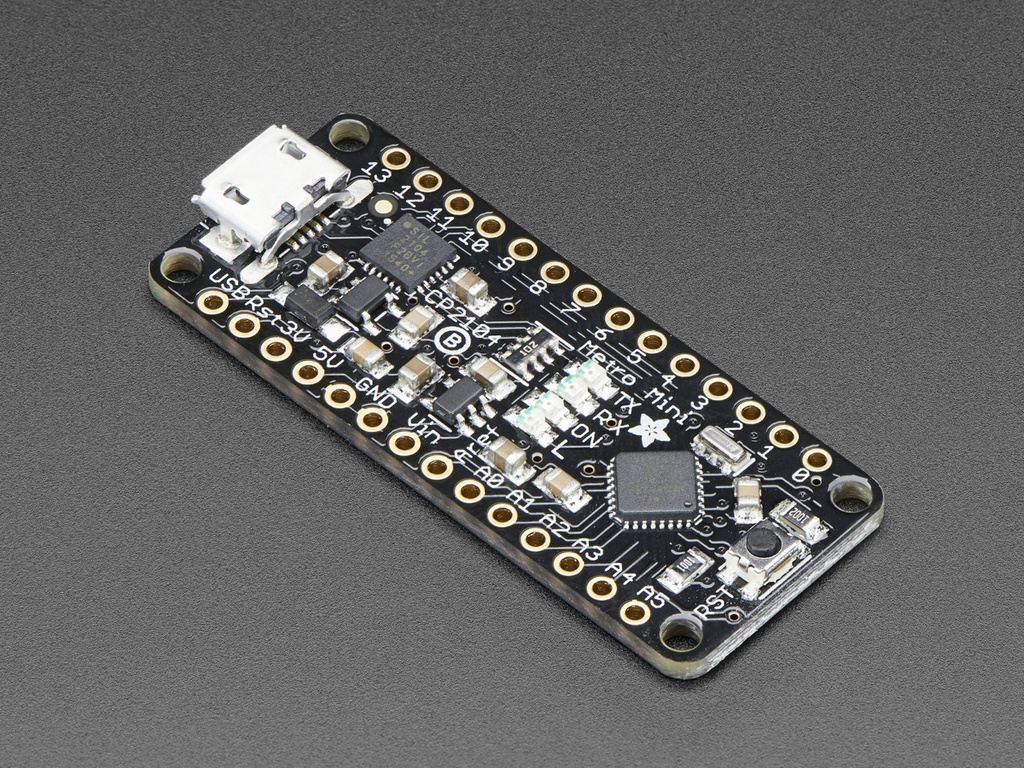Description: Make your Arduino-based project tiny and with the Adafruit METRO Mini! The METRO Mini works great with the Arduino IDE, and runs the ATmega328P at 16MHz so it is pin-compatible with Arduino UNO R3 - note you won't be able to plug in shields, but great for use with breadboards. You can use this with the Arduino IDE (both desktop and cloud version) by selecting 'Arduino UNO' in the Boards menu.
We sure love the ATmega328 here at Adafruit, and we use them a lot for our own projects. The processor has plenty of GPIO, Analog inputs, hardware UART SPI and I2C, timers and PWM galore - just enough for most simple projects. When we need to go small, we use a Pro Trinket 3V or 5V, but if you want to have USB-to-Serial built in, we reach for an Adafruit METRO Mini.
METRO Mini is the culmination of years of playing with AVRs: we wanted to make a tiny, breadboard-friendly development board that is easy to use and is hacker friendly. Metro Mini can be programmed with the Arduino IDE (select 'UNO' in the boards dropdown)
- ATmega328 brains - This popular chip has 32KB of flash (1/2 K is reserved for the bootloader), 2KB of RAM, clocked at 16MHz
- Power the METRO Mini with 6-16V polarity protected on the Vin pin, or plug the micro USB connector to any 5V USB source.
- METRO has 20 GPIO pins, 6 of which are Analog in as well, and 2 of which are reserved for the USB-serial converter. There's also 6 PWMs available on 3 timers (1 x 16-bit, 2 x 8-bit). There's a hardware SPI port, hardware I2C port and hardware UART to USB.
- GPIO Logic level is 5V but by cutting and soldering closed a jumper on the bottom, you can easily convert it to 3.3V logic
- 5V onboard regulator with 150mA out, 3.3V 50mA available via FTDI chip
- USB to Serial converter, there's a genuine SiLabs CP2104 hardware USB to Serial converter that can be used by any computer to listen/send data to the METRO, and can also be used to launch and update code via the bootloader
- Four indicator LEDs, on the top of the PCB, for easy debugging. One green power LED, two RX/TX LEDs for the UART, and a red LED connected to pin PB5 / digital #13
- Easy reprogramming, comes pre-loaded with the Optiboot bootloader
- Beautiful styling by PaintYourDragon and Bruce Yan, in Adafruit Black with gold plated pads.
The Metro Mini comes as a fully assembled and tested board, with bootloader burned in and also a stick of 0.1" header. Some light soldering is required if you'd like to plug it into a breadboard, or you can solder wires or header directly to the breakout pads. Once headers are installed they can be fitted into 0.6" wide sockets
Mac & Windows People! Don't forget to grab & install the FTDI VCP drivers from FTDI and the SiLabs CP210x drivers from SiLabs to make the COM/Serial port show up right! The default drivers may not support the interface chip!
Features:
- As of Nov 8th 2016, we are now shipping with the SiLabs CP2104 - a high quality USB-to-Serial converter that performs as well or better than the FTDI series
Detailed specifications:
- ATmega328 microcontroller with Optiboot (UNO) Bootloader
- USB Programming and debugging via the well-supported genuine FTDI FT231X or the SiLabs CP2104
- Input voltage (Vin): 6-16V (a 9VDC power supply is recommended)
- 5V logic with 3.3V compatible inputs, can be converted to 3.3V logic operation
- 20 Digital I/O Pins: 6 are also PWM outputs and 6 are also Analog Inputs
- 32KB Flash Memory - 0.5K for bootloader, 31.5KB available after bootloading
- 16MHz Clock Speed
- Adafruit Black PCB with gold plate on pads
- 18mm x 44mm x 4mm / 0.7" x 1.7" x 0.2"
- Weight: 3g
Documentation and Downloads









